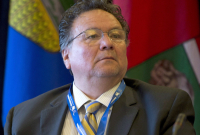Support strong Canadian climate journalism for 2025
Dennis Fentie, who served as Yukon premier for nine years, died Friday at the age of 68.
Fentie served as the territory's seventh premier from 2002 to 2011 as leader of the Yukon Party, which confirmed his death in a statement.
He was first elected as a New Democrat to the legislative assembly in 1996, representing Watson Lake.
He crossed the floor to the Yukon Party in May 2002, then won the party's leadership and led it victory over the Liberals later that year.
Fentie, who was also the territory's finance minister, won a second term in 2006 and stepped down as leader 2011.
Yukon Party Leader Stacey Hassard said in a statement that Fentie helped transfer more power from the federal government to the territory and made the economy his focus.
"Over his nine years as premier, he was instrumental in negotiating a better health care funding agreement between the territories and Canada as well as for getting improvements to the territorial formula financing arrangements," he said, adding that Fentie had "a tenacious spirit."
Hassard said Fentie was responsible for patients having access to modern hospitals in Dawson City and Watson Lake.
"A hard-working premier who always had the best interests of Yukon at heart, Dennis was, above all else, a great friend to all of us and he will be sincerely missed. Our heartfelt condolences go out to his family."
Yukon Premier Sandy Silver said Fentie worked to ensure communities in the rural areas of the territory had a greater say in decision making.
"Mr. Fentie's distinguished career had an immeasurable impact on the territory and all Yukoners," he said in a statement.
Fentie was born in Edmonton and moved to Watson Lake in 1962 at the age of 12.
He was also the owner of a construction company.
His career wasn't without controversy. Before he was elected, Fentie admitted that he had been arrested for drug trafficking in 1975 and served 17 months in prison. He was pardoned in 1996.
After he was elected, Fentie said he was embarrassed about the conviction.
Flags at government buildings were lowered to half-mast in memory of Fentie.





Comments